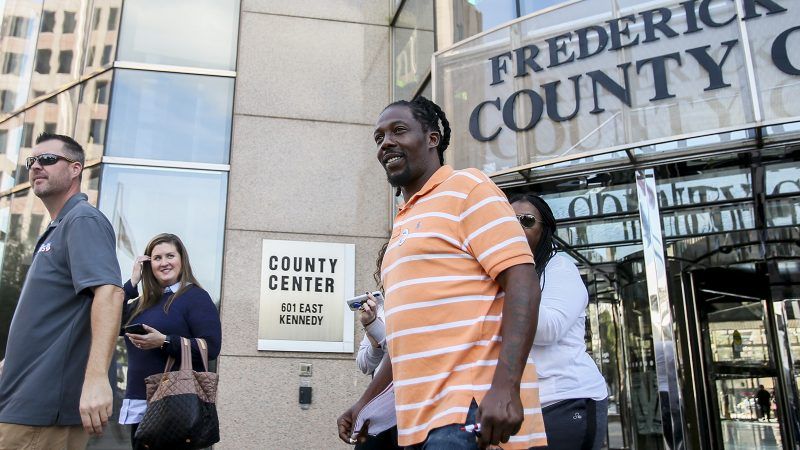Federal Appeals Court: Florida Can't Require Payment of Court Debts To Regain Voting Rights
"Equally guilty but wealthier felons are offered access to the ballot while these plaintiffs continue to be disenfranchised, perhaps forever."

A federal appeals court ruled today that a new Florida law stripping voting eligibility from felony offenders who are too poor to pay off their court debts is unconstitutional.
The 11th U.S. Circuit Court of Appeals in Atlanta upheld a temporary injunction issued by a federal judge last year in favor of 17 plaintiffs who sued the state, saying they were too poor to pay off their court-imposed fines and fees, and thus were barred from voting for no reason other than their poverty. The narrow ruling only applies to plaintiffs in the case, but it's a setback for Florida Republicans' attempts to limit the scope of a 2018 amendment to the state constitution that restores voting rights to felony offenders.
The 11th Circuit found that the state's law requiring the plaintiffs to pay their court debts before they can regain their voting rights violates the Equal Protection Clause of the 14th Amendment. Stripping voting rights from poor offenders who can't afford to pay fines and fees, the court wrote, doesn't advance the state's interest in collecting debts, and it creates disparate punishments based solely on wealth.
"Here, the plaintiffs are not punished in proportion to their culpability but to their wealth—equally guilty but wealthier felons are offered access to the ballot while these plaintiffs continue to be disenfranchised, perhaps forever," the opinion states.
In 2018, Florida voters approved Amendment 4, an amendment to the state constitution that restored voting eligibility to an estimated 1.4 million residents with felony records. At the time, it was hailed as one of the largest single expansions of voting rights in U.S. history.
Prior to the passage of Amendment 4, Florida had one of the harshest felon disenfranchisement laws in the country—a vestige of the state's "Black Codes," passed during Reconstruction. It was only one of four states that imposed lifetime bans on voting for people with felony records.
However, disputes over Amendment 4's implementation began almost immediately. The language of the amendment says felony offenders regain eligibility to vote "upon completion of all terms of sentence including parole or probation," but it does not say whether "all terms" included financial obligations imposed by courts.
Florida Republicans argued it did. (Notably, so did lawyers for groups supporting the amendment before it was passed.) The GOP-controlled state legislature then introduced and passed a bill to require payment of court-imposed debts as a condition of regaining one's right to vote.
However, Democrats and civil liberties groups say the requirement to pay court debts amounts to a "poll tax" and stymies the will of Florida voters, who passed Amendment 4 by 64 percent.
A flurry of lawsuits followed. Last October, a U.S. District Court judge issued a temporary injunction, ruling that the state must create a system to determine ability to pay. "Each of these plaintiffs have a constitutional right to vote so long as the state's only reason for denying the vote is failure to pay an amount the plaintiff is genuinely unable to pay," the judge wrote.
In January, the majority-conservative Florida Supreme Court issued an advisory opinion upholding the state law.
Civil liberties groups representing the plaintiffs in the federal lawsuit, such as the American Civil Liberties Union and the Brennan Center for Justice, applauded today's opinion.
"The Eleventh Circuit told the state of Florida what the rest of America already knows," Myrna Perez, director of the voting rights and elections program at the Brennan Center, said in a statement. "You can't condition the right to vote on a person's wealth."
The Fines & Fees Justice Center has found that Florida courts, which are funded almost entirely through fines and fees, had "115 different types of fees and surcharges, the second highest number in the country." As a result, WLRN reports, Florida felony offenders will have to pay back hundreds of millions of dollars to restore their voting rights. "Across the state, over $1 billion in felony fines were issued between 2013 and 2018 alone, according to annual reports from the Florida Clerks and Comptrollers, a statewide association. Over that five year period, an average of only 19 percent of that money was paid back per year."
The ruling is far from the end of the fight over Amendment 4. A full trial in the lawsuit is set for April, at which point the temporary injunction will expire. In a tweet, a spokesperson for Republican Florida Gov. Ron DeSantis' office said the state will appeal today's ruling and seek an en banc rehearing at the 11th Circuit.
Both sides expect the case to be appealed all the way to the U.S. Supreme Court.


Show Comments (38)